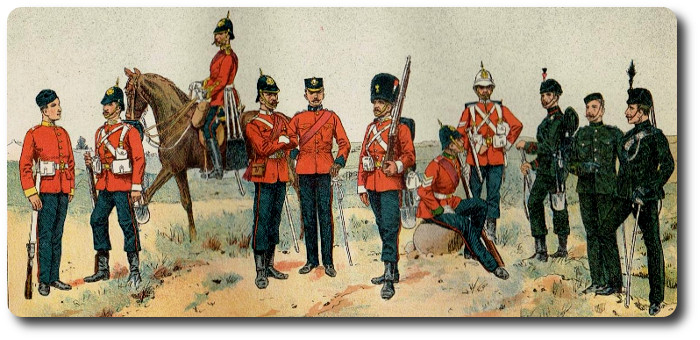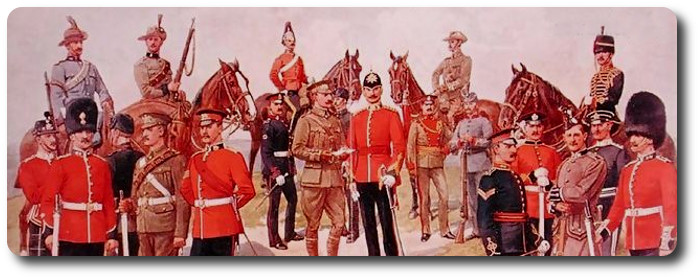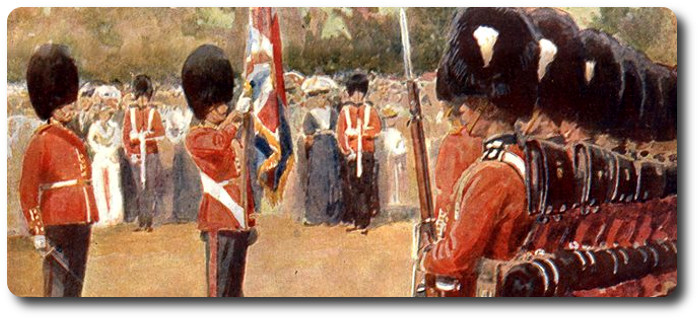Topic: British Army

The Ineffective British Army (1903)
Boston Evening Transcript, 7 February 1903
By Jack J. Hart, Late of the Grenadier Guards
It is notable that reforms effected in the British naval and military services have always been the result of outside agitation. In England the war office and admiralty are only nominally the executive powers of the services of which they are at the head. The real executive in both cases is the voice of the country. Particularly of the war office it may be said that not until the press has been spoken in a voice so loud that it cannot be disregarded will it take action in anything more important than selecting the pattern on a soldier's button. Perhaps it is because the war office believes that a task which is now before it is peculiarly difficult of accomplishment that not even the voice of public opinion can move it; and that instead of beginning the work, it appears to be engaged in solving the, often for it, momentous problem: "how not to do it" by making various changes in ceremonial drill. When the improved weapons of warfare were—for the first time—put to test on South African battlefields, military experts were confounded and it was clearly proven to the world that in military tactics a new era had begun, numbers, discipline, and even generalship, took a second place, and individual intelligence of the soldier was proven to be of first importance.
There was a time when warfare was the clashing together and wrestling of great masses of men. But it has gone forever. By the invention of gunpowder the medieval art of war was changed into the modern. With the improvement of firearms, gradually individual intelligence of the combatants became more essential to their efficiency united; albeit commanders were very slow in recognizing the fact. On the advent of quick-firing guns, unknown to the doctrinaires who fought battles on paper, numbers, discipline, and even generalship, took a second place, but it was not until the highly organized regiments of Britain were led against South African farmers that the world realized the fact, then clearly demonstrated, that in the battle of the future the individual intelligence of the soldier would be first in insuring victory.
It might be expected that Great Britain, having learned the lessons of the South African War by experience and to her cost, would, for that reason, be the first to profit by them and to adapt herself to the new order of things. Such, however, is not the case. Although reforms have been mooted, her military system, in its constitution as in its government, is still wedded to conservatism and old traditions. Practically nothing has been done that would tend to develop the individual intelligence of the soldiers, and so render him capable of acting judiciously in dangerous situations on his own initiative. The slavish respect for his superiors which is inculcated into the British soldier in his daily life is not well calculated to teach him self-reliance; and the fact that British officers are drawn from the titled classes, which Englishmen almost worship, makes this slavish respect, in English regiments at least, particularly difficult of elimination. The officer is the ruling intelligence. His authority must never be questioned. His judgment is infallible. If a private soldier criticises him adversely, the private is guilty of, in the language of military law, "conduct to the prejudice of good order and military discipline." In the ranks of the old British army, blind obedience to superiors on all occasions is the erroneous principle that guides. Concatenation is the necessary consequence. The subordinate is dependent on his superior. He is slow, because unaccustomed to act without his superior's commands; and, in situations where quick and decisive action is of prime importance, he is easily outwitted by the versatility of a self-reliant opponent.
Concatenation and lack of self-reliance among the rank and file of the British army may be said to constitute its greatest weakness, inasmuch as both hamper its operations in the field. If the number of drilled troops in South Africa at the outbreak of the last war had been so many undisciplined rough-riders knowing no more of military tactics than how to "sight" a rifle and press the trigger, I do not hesitate to say, the long and bitter struggle which cost England dear in blood and money and turned a fertile country into a "howling wilderness" would (with all respect to the Boer as a fighter) have ended before three months in the defeat of the republican armies. The undisciplined rough-rider would have fought the Boer with the Boer's own weapons, and numbers would have prevailed. The instinct of self-preservation would have taught the undrilled soldier to take advantage of available cover on all occasions; and if he found himself standing before a fusillade so deadly that common sense told him it would be suicide to remain, he would not have waited the command of a superior to advance, or retreat. It might at first sight be thought that concatenation in an army is desirable inasmuch as it secures uniformity of action, for if each part of a whole is dependent on another part none will act alone and the strength of concerted action is the result. But modern warfare, especially that carried on in a hilly country, has become a game of hide-and-seek, developing fresh surprises at every turn, that quick, independent and decisive action, suiting itself to the exigencies of occasions; is, for the different units of a division and for individual composing them, a matter of paramount importance. Concerted attack, by which a force is directed against one point in an enemy's line, is a thing of the past.
The system of training followed in the British army does not contribute much to rendering it more efficient as a fighting machine under the conditions of modern warfare. The greater part of the soldier's time during the first three months of his service as a recruit is spent in useless ceremonial drill. Almost the entire time at the depot from which he derives any benefit is the daily hour spent in the gymnasium. Up to the time of joining his battalion, he has not once used his rifle at the target. A few months after leaving the depot he is exercised in a recruit's course of musketry, and is then called a trained soldier. After this, he is allowed forty-two rounds of ball ammunition annually, and by the practice thus afforded is expected to become a marksman. Rivalry, however, often exists between the different companies of a battalion, and this induces captains of companies to purchase ammunition at their own expense—in the hope that by extra practice their companies may become more proficient and win the shooting trophies that are so greatly prized.
During autumn manoeuvres, the soldier would learn much that would be of use to him were it not for the indifference of his officers. Hostile forces oppose each other and fight, day by day, among hills, woods and valleys; but ask a soldier what it all means and he will reply that he does not know. He only knows that he obeys orders. He cannot even tell whether the division to which he belongs is attacking or defending, advancing or retiring. His officers will not take the trouble to tell him; some of them do not know. Yet, if the whole plan of the manoeuvres were intelligently explained to the soldier and maps of the country placed in his hands, the benefits he would derive from this annual exercise are incalculable.

In its constitution, the British army has many defects; the principal being the paucity of numbers of the medical corps and the commissariat. Even in a country easy of transport as South Africa, the latter proved itself wholly incapable of performing the work that devolved on it. The medical corps would there have been a still greater failure were it not for the voluntary service by which it was supplemented. The regimental constitution is, in some of its effects, detrimental to the efficiency of the soldier. For from the private to the colonel, each must unquestionably obey the will of his superior and it will be admitted that there is little room for initiative, or development of intelligence in the ranks.
Of the war office, as the governing authority, little need be said. In England it has become a synonym of stupidity. Its actions are often incomprehensible. One instance will suffice: During the South African War Canada raised a regiment to garrison Halifax, and maintained it at the expense of the Dominion until after the declaration of peace. The Imperial Conference in London followed, and it was proposed that Canada should contribute to the maintenance of the British navy. The Dominion dissented, but offered to permanently garrison Halifax and Esquimalt, thus to relieve the Imperial Government of the expense of maintaining troops at those places. After the conference, Canada's policy was severely crticised in England, and the cry was again raised that she was unwilling to bear her fair share of the expense of imperial defence. Then the war office, instead of allowing the Dominion to maintain its own garrisons, caused the Royal Canadian Regiment at Halifax to be disbanded, and incurred the expense of sending troops from England and maintaining them in its place. Various pleas have been urged in defence of this action. Among them, that imperial troops in Canada constitute a visible tie between that country and England which it would be dangerous to sever; but this, on the face of it, is little short of an insult to the loyalty of the Canadian people.
Though last to be considered here, the morale of an army is hardly last in importance in estimating the probabilities of its success in the field. It is a fact, though some are slow to admit it, that professional soldiers are not, as a rule, patriots. To the civilian, the defence of his country is a sacred duty. To the professional soldier it is the ordinary humdrum business of everyday life. Composed of three distinct nationalities as the British army is, it is only natural that a common patriotism should not be its pervading spirit. Irishmen, Englishmen, and Scotchmen have not blended into one race in the past and the probabilities are that they never will. There are many Irishmen in the British army today who are hostile to the very name of England. The gallant charges of Irish regiments on South African battlefields prove nothing to the contrary. Irishmen—because it is in their nature—will fight hard when facing any foe, merely for the glory of a "scrap."
It is on account of this diversity of race that the regular army of Britain can never become a body animated by a common spirit. Whatever may have been the talisman, patriotism did not win its victories of the past. I would rather attribute them to the caution of the Scotchman, the dogged persistence of the Englishman, and the dashing bravery of the Irishman.


